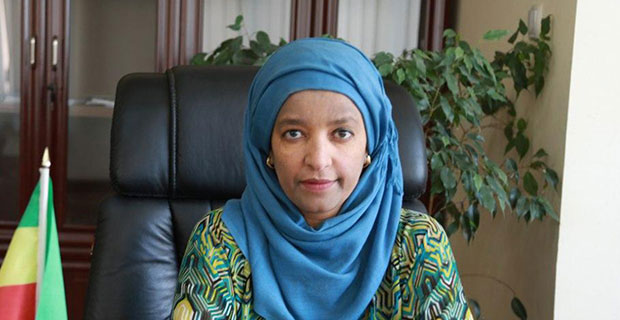
Radar | Nov 06,2021
Jun 5 , 2021
By HAWI DADHI
 Hikmet Abdella, director-general of the Board.
Hikmet Abdella, director-general of the Board. A federal board overseeing audit practice is to begin a review of financial reports filed in compliance with the International Financial Reporting Standards (IFRS), from institutions including banks, insurance firms and state-owned enterprises such as Ethio telecom, and Ethiopian Energy & Power (EEP).
The Accounting & Auditing Board of Ethiopia (AABE) began compelling companies to convert their financial reporting requirement from a general standard to the IFRS, following a law parliament passed in 2015. About 8,000 companies, including share companies, state-owned enterprises, private limited companies, and small and micro enterprises, are expected to comply with one of the three reporting standards.
The Commercial Bank of Ethiopia was the first financial institution to convert its financial reporting to IFRS in 2017, a year before the deadline set for financial entities.
The review, which is part of a regulatory capacity-building project funded by the World Bank, will comprise institutions submitting IFRS reports for the first or second time over the past three years, and the Board will select from among them based on its own criteria. Although the amount of reports to be reviewed has yet to be decided, reports from three categories will be chosen, officials of the Board disclosed.
"These will be either risk-based or random sampling of reporting entities," Hikmet Abdella, director-general of the Board, told Fortune. "It'll need experience and further discussions as we go along."
The Ethiopian counterpart of the Association of Chartered Certified Accountants (ACCA), a global organisation invested in professional certification of accounts since 1904, will give capacity building and technical support to the Board. It has already started with the development of review standards, checklists, and best practice guidelines. It also instructs reviewers from the Board in the form of regular and on-the-job training.
ACCA Ethiopia has over 1,000 active trainees and 564 certified members under its wing.
Reporting entities have slowly been implementing international standards based on the roadmap prepared by the Board. Only two reports were received in the first year since the establishment of the Board, and the number rose to 50 in 2018. The total number of reports received this year stands at over 1,000, 54 of which are from small and medium enterprises (SMEs).
According to Hikmet, the staff that will be involved in the review are currently undergoing training, and the Board aims to finalise the preparatory work, including identifying reports to be reviewed by the third week of June.
Some reviews will be conducted with the direct support of ACCA's experts, according to Yodit Kassa, head of ACCA Ethiopia.
"The reviews will be beneficial in providing added credibility to these reports, which investors could potentially use in doing market analysis," she said.
If the reviewed reports are found to be below standards, the Board has the authority to launch more formal inquiries and proceedings that could lead to replacing accounts or other disciplinary action, according to Hikmet.
The implementation of IFRS was scheduled to be completed in 2020, but the Board has decided to push the deadline to 2024. It has classified implementers of IFRS into three; full implementers, IFRS for small and medium-sized institutions, and IFRS for charity (IPSAS).
Institutions with annual revenues or budgets of more than 300 million Br and employ over 200 people qualify for the full IFRS implementation. Those with annual revenues between 20 million Br and 300 million Br and hire between 20 and 200 people are recognised as small and medium-sized entities. While institutions qualifying for full IFRS have two years to complete the conversion, small and medium enterprises are given one more year to implement the reporting standard, a prospect industry insiders view as "daunting."
Abraham Zewdi, head of an accounting firm that has taken the required IFRS training, sees that small and medium-sized organisations face a challenge in cost as accounting work based on IFRS requires more human capital investment and paperwork.
"Accountants will be forced to impose higher rates for their services, likely affecting early adoption," said Abraham.
The conversion to IFRS reporting has been far from smooth. From an unwillingness to make an effort on the side of business owners to a lack of professionals in the market and loose supervision, the work has seen its fair share of obstacles.
Of the hundred small and medium-sized organisations that are Abraham's clients, none are willing to make the conversion ahead of the deadline, according to Abraham.
For many businesses, especially those managed by owners, filing financial statements are meant only to comply with tax purposes, says Nardos Worku, managing partner of NBN Consulting General Partnership. His firm has conducted the conversion of 23 full IFRS and 23 IPSAS, each with a fee of about 350,000 Br on average.
"This makes it hard for them to see the benefit of IFRS," he said.
Another challenge is the shortage of skilled and certified accountants, as well as auditors, specialized in IFRS, a factor that has contributed to the increase in costs required to implement IFRS.
"The regulators should implement more stringent rules such as ensuring auditors' rotation and incorporating capacity requirements to certify public auditors," said Nardos.
There are 157 certified auditors and 966 accountants listed on AABE's website and only three certified asset valuation companies in Ethiopia.
The Board has finalised a regulation to set up the Institute of Certified Public Accountants of Ethiopia, which Hikmet hopes will help train the much-needed certified accountants for the private and public sectors.
PUBLISHED ON
Jun 05,2021 [ VOL
22 , NO
1101]

Radar | Nov 06,2021

Fortune News | Aug 02,2025

Radar | Oct 30,2021

My Opinion | Feb 24,2024

Sunday with Eden | May 20,2023

My Opinion | Aug 18,2024

Featured | Jan 05,2019

Fortune News | Oct 14,2023

Life Matters | Sep 04,2021

Fortune News | Mar 07,2020

Dec 22 , 2024 . By TIZITA SHEWAFERAW
Charged with transforming colossal state-owned enterprises into modern and competitiv...

Aug 18 , 2024 . By AKSAH ITALO
Although predictable Yonas Zerihun's job in the ride-hailing service is not immune to...

Jul 28 , 2024 . By TIZITA SHEWAFERAW
Unhabitual, perhaps too many, Samuel Gebreyohannes, 38, used to occasionally enjoy a couple of beers at breakfast. However, he recently swit...

Jul 13 , 2024 . By AKSAH ITALO
Investors who rely on tractors, trucks, and field vehicles for commuting, transporting commodities, and f...

Oct 4 , 2025
Eyob Tekalegn (PhD) had been in the Governor's chair for only weeks when, on Septembe...

Sep 27 , 2025
Four years into an experiment with “shock therapy” in education, the national moo...

Sep 20 , 2025
Getachew Reda's return to the national stage was always going to stir attention. Once...

Sep 13 , 2025
At its launch in Nairobi two years ago, the Africa Climate Summit was billed as the f...